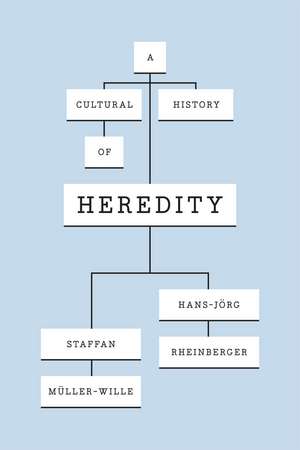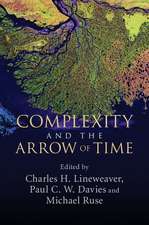A Cultural History of Heredity
Autor Staffan Müller-Wille, Hans-Jörg Rheinbergeren Limba Engleză Paperback – 10 noi 2014
It was only around 1800 that heredity began to enter debates among physicians, breeders, and naturalists. Soon thereafter it evolved into one of the most fundamental concepts of biology. Here Staffan Müller-Wille and Hans-Jörg Rheinberger offer a succinct cultural history of the scientific concept of heredity. They outline the dramatic changes the idea has undergone since the early modern period and describe the political and technological developments that brought about these changes.
Müller-Wille and Rheinberger begin with an account of premodern theories of generation, showing that these were concerned with the procreation of individuals rather than with hereditary transmission. The authors reveal that when hereditarian thinking first emerged, it did so in a variety of cultural domains, such as politics and law, medicine, natural history, breeding, and anthropology. Müller-Wille and Rheinberger then track theories of heredity from the late nineteenth century—when leading biologists considered it in light of growing societal concerns with race and eugenics—through the rise of classical and molecular genetics in the twentieth century, to today, as researchers apply sophisticated information technologies to understand heredity. What readers come to see from this exquisite history is why it took such a long time for heredity to become a prominent concept in the life sciences and why it gained such overwhelming importance in those sciences and the broader culture over the last two centuries.
Müller-Wille and Rheinberger begin with an account of premodern theories of generation, showing that these were concerned with the procreation of individuals rather than with hereditary transmission. The authors reveal that when hereditarian thinking first emerged, it did so in a variety of cultural domains, such as politics and law, medicine, natural history, breeding, and anthropology. Müller-Wille and Rheinberger then track theories of heredity from the late nineteenth century—when leading biologists considered it in light of growing societal concerns with race and eugenics—through the rise of classical and molecular genetics in the twentieth century, to today, as researchers apply sophisticated information technologies to understand heredity. What readers come to see from this exquisite history is why it took such a long time for heredity to become a prominent concept in the life sciences and why it gained such overwhelming importance in those sciences and the broader culture over the last two centuries.
Preț: 229.73 lei
Nou
Puncte Express: 345
Preț estimativ în valută:
43.96€ • 45.84$ • 36.54£
43.96€ • 45.84$ • 36.54£
Carte tipărită la comandă
Livrare economică 21 martie-04 aprilie
Preluare comenzi: 021 569.72.76
Specificații
ISBN-13: 9780226213484
ISBN-10: 022621348X
Pagini: 288
Ilustrații: 16 halftones, 9 line drawings
Dimensiuni: 152 x 229 x 23 mm
Greutate: 0.46 kg
Editura: University of Chicago Press
Colecția University of Chicago Press
ISBN-10: 022621348X
Pagini: 288
Ilustrații: 16 halftones, 9 line drawings
Dimensiuni: 152 x 229 x 23 mm
Greutate: 0.46 kg
Editura: University of Chicago Press
Colecția University of Chicago Press
Notă biografică
Staffan Müller-Wille is a senior lecturer and research associate with the ESRC Centre for Genomics in Society and the Centre for Medical History, both at the University of Exeter. Hans-Jörg Rheinberger is director at the Max Planck Institute for the History of Science in Berlin. They are the editors of Heredity Produced: At the Crossroads of Biology, Politics, and Culture, 1500–1870.
Cuprins
Preface
Chapter 1: Heredity: Knowledge and Power
Chapter 2: Generation, Reproduction, Evolution
Chapter 3: Heredity in Separate Domains
Chapter 4: First Syntheses
Chapter 5: Heredity, Race, and Eugenics
Chapter 6: Disciplining Heredity
Chapter 7: Heredity and Molecular Biology
Chapter 8: Gene Technology, Genomics, Postgenomics: Attempt at an Outlook
Notes
Bibliography
Index
Chapter 1: Heredity: Knowledge and Power
Chapter 2: Generation, Reproduction, Evolution
Chapter 3: Heredity in Separate Domains
Chapter 4: First Syntheses
Chapter 5: Heredity, Race, and Eugenics
Chapter 6: Disciplining Heredity
Chapter 7: Heredity and Molecular Biology
Chapter 8: Gene Technology, Genomics, Postgenomics: Attempt at an Outlook
Notes
Bibliography
Index
Recenzii
“A deeply researched, well-referenced history of the definition and application of heredity from a cultural perspective, covering the earliest ideas through modern genomic application. . . . This work will have broad appeal for students studying biology, ethics, science history, and potentially, law. Recommended.”
“[A]n essential resource for those interested in the study of heredity—in any time period or disciplinary tradition, from seventeenth-century studies of generation to contemporary work on the ethics of genetically modified organisms or human cloning. Müller-Wille and Rheinberger’s contribution thus serves as a valuable addition to our existing histories of generation, heredity, and genetics.”
"Big-picture synthetic histories have a deserved reputation for being worthy but dull. A Cultural History of Heredity has escaped that fate entirely. From start to finish, this is history as argument, marshalling an astonishing amount of material in the service of a single and, even in this sophisticated form, simple thesis. Everyone interested in the long run of ‘heredity’--a word that indeed had no meaningful life in English until the likes of Herbert Spencer and Francis Galton gave it currency, adapting recent French usage--should be grateful to have had so much information and insight pulled together into such an economical (in both senses) package."
"In the best sense of the word this book is a distillation--of a difficult and unintuitive concept, of a complex historiography, and of a rich methodology. . . . For those who wish for a book that would quickly, dynamically, and authentically take them into the richest and most exciting area of a large body of scholarship, this book does this and does it with style. The result is an eminently enjoyable read."
“This thought-provoking analysis of the changing cultural position of heredity will be as enjoyable as it is challenging to readers. It includes a substantial and very full bibliography that should provide any avid historian of genetics with an abundance of background reading. Although a historian of science is the obvious audience for this work, any scientist interested in genetics will find this an enlightening look at the history of this field.”
“A Cultural History of Heredity is an enormously interesting and persuasive book that will speak not only to historians of science but also to biologists and general social and intellectual historians interested in the interface between the nitty-gritty of biology and the backdrop of social and cultural affairs.”
“Staffan Müller-Wille and Hans-Jörg Rheinberger masterfully delineate the evolution of the concept of heredity since the late eighteenth century, its transformation from the cultural metaphors of gardens and families to the biological tools of genetic engineering and the genome. Breathtaking in scope, their book ranges across multiple national boundaries and illuminates how ideas of heredity were—and continue to be—shaped by forces of culture, law, medicine, technology, and markets. In all, a compelling and original synthesis of a vast body of primary sources and recent scholarship.”
“In this original and insightful book Staffan Müller-Wille and Hans-Jörg Rheinberger do not take the concept of heredity for granted. Rather they offer an account of the rise of the epistemic space in which heredity took shape as a biological concept and moved to the forefront of biological research. Deeply informed and covering much ground, the book is certain to provide rich food for thought and stimulate further investigation.”












